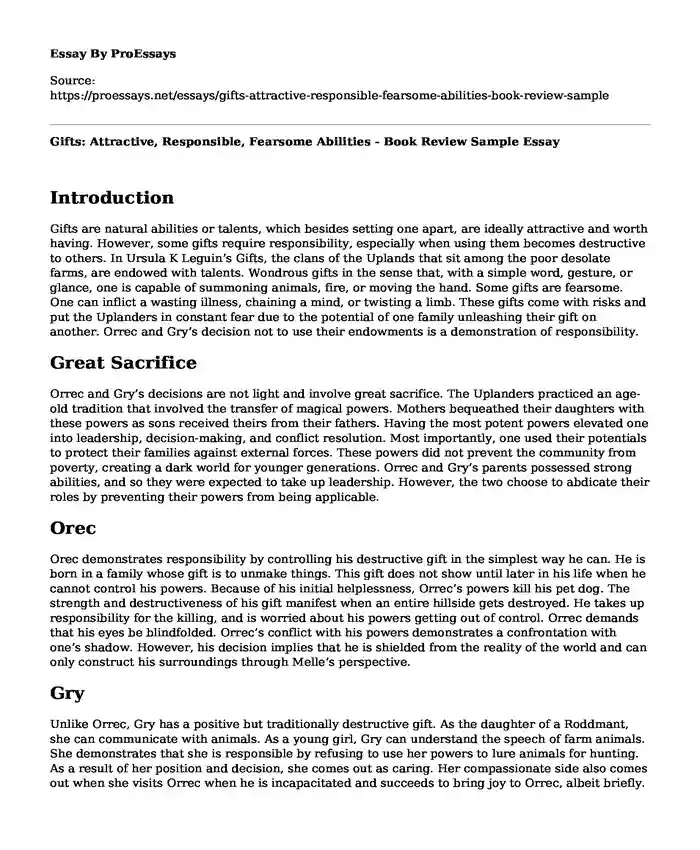Introduction
Gifts are natural abilities or talents, which besides setting one apart, are ideally attractive and worth having. However, some gifts require responsibility, especially when using them becomes destructive to others. In Ursula K Leguin’s Gifts, the clans of the Uplands that sit among the poor desolate farms, are endowed with talents. Wondrous gifts in the sense that, with a simple word, gesture, or glance, one is capable of summoning animals, fire, or moving the hand. Some gifts are fearsome. One can inflict a wasting illness, chaining a mind, or twisting a limb. These gifts come with risks and put the Uplanders in constant fear due to the potential of one family unleashing their gift on another. Orrec and Gry’s decision not to use their endowments is a demonstration of responsibility.
Great Sacrifice
Orrec and Gry’s decisions are not light and involve great sacrifice. The Uplanders practiced an age-old tradition that involved the transfer of magical powers. Mothers bequeathed their daughters with these powers as sons received theirs from their fathers. Having the most potent powers elevated one into leadership, decision-making, and conflict resolution. Most importantly, one used their potentials to protect their families against external forces. These powers did not prevent the community from poverty, creating a dark world for younger generations. Orrec and Gry’s parents possessed strong abilities, and so they were expected to take up leadership. However, the two choose to abdicate their roles by preventing their powers from being applicable.
Orec
Orec demonstrates responsibility by controlling his destructive gift in the simplest way he can. He is born in a family whose gift is to unmake things. This gift does not show until later in his life when he cannot control his powers. Because of his initial helplessness, Orrec’s powers kill his pet dog. The strength and destructiveness of his gift manifest when an entire hillside gets destroyed. He takes up responsibility for the killing, and is worried about his powers getting out of control. Orrec demands that his eyes be blindfolded. Orrec’s conflict with his powers demonstrates a confrontation with one’s shadow. However, his decision implies that he is shielded from the reality of the world and can only construct his surroundings through Melle’s perspective.
Gry
Unlike Orrec, Gry has a positive but traditionally destructive gift. As the daughter of a Roddmant, she can communicate with animals. As a young girl, Gry can understand the speech of farm animals. She demonstrates that she is responsible by refusing to use her powers to lure animals for hunting. As a result of her position and decision, she comes out as caring. Her compassionate side also comes out when she visits Orrec when he is incapacitated and succeeds to bring joy to Orrec, albeit briefly. When the two marry, they understand that the gifts they have limit their perspectives to Uplands. She promises that they “might go as far as the ocean shore.”
Theme
One theme that runs through the story, and which lends to the sense of responsibility demonstrated by the two main characters is coming of age. Orrec has a unique gift, a talent, magic. He possesses the gift of “unmaking” while he prefers the gift of “making” (. This dilemma creates a sense of retrospection, a desire to find one’s right course. Power and responsibility require identity, the coming of age, and acceptance of what one represents. Orrec debates his decision, and he is initially conflicted about whether to use his powers or betray them. A similar script plays with Gry. She is reluctant to use her gifts to risk the lives of the animals. She evaluates and must determine if “all gifts are backward” (Le Guin, 2004). Orrec and Gry overcome their fears and chains when they cease to look at the duality of their choices. On the one hand, their gifts serve to dominate and control while allowing no space for growth. On the other hand, their gifts allow healing and nurturing, which is essential for their growth and that of the community.
Conclusion
In Gifts, Ursula K Leguin shows how the capacity to change their environments, communities, and the world either positively or negatively lies in oneself. One can overcome whatever forces within them and influence others to make the right decisions that ultimately bring the change they want to see. While Orrec has the responsibility to use his destructive powers to protect his family, he looks at the bigger impact of using his powers and concludes that a better world would result if he restrained. On her part, Gry finds that using her powers in the old way of the family would risk the lives of the animals she communicates. In this regard, she takes a greater responsibility towards conserving the environment and establishing a setting in which there is peaceful coexistence. She chooses to be an advocate of peace and respect for animals. Most importantly, the two choose to expand the scope of their communities and choose collaboration instead of restraint and distrust. They marry and move yonder.
References
Le Guin, U.K. (2004). Gifts (Vol. 1). Houghton Mifflin Harcourt.
Cite this page
Gifts: Attractive, Responsible, Fearsome Abilities - Book Review Sample. (2023, Oct 14). Retrieved from https://proessays.net/essays/gifts-attractive-responsible-fearsome-abilities-book-review-sample
If you are the original author of this essay and no longer wish to have it published on the ProEssays website, please click below to request its removal:
- Essay Sample on Dissociative Identity Disorder
- Course Work Example: Self-Awareness Exercise
- Paper Example on General Racism and How It Manifests in "A Raisin in the Sun"
- Reflective Paper on Schizophrenia
- Essay Example on Jane: A Life of Love and Loss
- Forensic Analysis of Mr. M: Psychopathy, Thought Disorder, Delusion - Essay Sample
- Essay Example on Exploring My Personality: An Introverted Extrovert Leader in the Making







